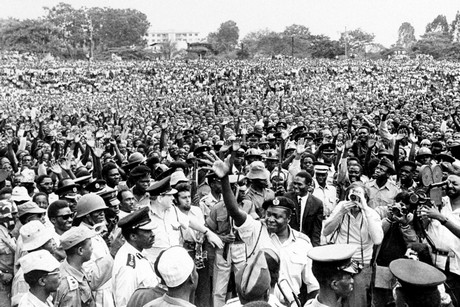Idi Amin in Kampala, Uganda, in 1971. Dinaw Mengestu’s third novel is based in part on the tragedy of Uganda under a violent dictatorship. AP Photo / Jun 2014
The Ethiopian-American author Dinaw Mengestu’s third novel, All Our Names[Amazon.com], tells the story of Isaac, a name stretched to fit not one but two characters whose lives unfold in alternating narratives. In one of these narratives (Isaac), two men form a close friendship in Kampala during a coup, and in the other (Helen), set a year or two later, one of them attempts a love affair with an American woman in a small town in the Midwest.
In the Isaac narrative, we are guided around the revolutionary foment of Amin-era 1970s Kampala by a young man who will eventually take the name of his best friend Isaac when he leaves Uganda for the US. He is a foreigner in Kampala, recently arrived from Ethiopia with ambitions to become a university student and a writer. Over the novel’s first few pages, Mengestu gradually draws out the revelation that even the first of these dreams is impossibly unrealistic.Mired in poverty, neither of the two friends has the means to do more than spectate at the edges of a college scene that is already a palimpsest of imitations. Real and aspiring students alike model themselves on famous figures. The narrator cannot afford even this imitation, but there is some comfort, in this novel, in the fact that imitations are all there is to be had. The dreams of the immediate aftermath of colonialism are turning sour and in the new postcolonial mode, students imitate revolutionaries, the state imitates a state and the narrator simply follows his friend around as he lives out his fantasies.
Helen’s town, where she and the man she knows as Isaac meet after he leaves Uganda, is also freighted with unreality. The location is obviously intended to convey the purest essence of Middle America, so much so that the character herself often refers to “the rural mid-west” in a way that could reflect not just the structural needs of the novel but a not-implausible self-consciousness about her origins. Her relationship with Isaac gives her a new vision of herself, as if from outside; she reflects on how her life would have been had he not arrived, as if this unlived life remains palpable to her. Mengestu sketches out the love affair between Helen and Isaac with the same hazy mix of broad strokes and sharply rendered detail that characterises the Kampala scenes.
In Mengestu’s Uganda, everything is constantly, violently changing, so much so that specific events blur and lose distinction. There are struggles to survive poverty, an attempt to overthrow a dictatorship, a bloody civil war, but all these unfold gently, without dramatic tension. As nameless corpses pile up in nameless villages, the narrator notes down his observations of the landscape. Mengestu zooms in on details: a grey suit that matches the grey radio on which a state of emergency is announced over and over again; the wet towel with which the narrator cleans his face after being beaten.
But one senses that Mengestu’s intentions have defeated him a little. The attempt to render both the voice of a traumatised refugee with literary ambitions and that of a white American woman who has never left her home state is virtuosic in intention, but not quite in execution. Both characters seem to remain far away from us, and from themselves. Perhaps this poor rendering of character is itself a kind of virtuosity, reminding us that vehicles like literature, or even language, are imperfect vessels for conveying a world of wildly different real experiences, whether those of a frustrated Midwestern social worker or of a helpless witness to atrocities.
The novel’s most impressive quality is this pervasive aura of estrangement, as if reality were interchangeable for some other state of affairs, and therefore only minimally possible to describe. But this effect is also a kind of failure. Poor black Africans are only too often represented in this way, as remote and essentially unknowable. Western media coverage of events in Nigeria or the Democratic Republic of the Congo, for example, tends to paint specific political formations as if they were incomprehensible eruptions of evil. Africans, we are led to believe, are subjects of trauma so great that it exceeds even the limits of the concept of trauma. Their names change, they appear in one place and disappear in another. Against this erasure, it feels important to remember the former Haitian president Jean-Bertrand Aristide’s dictum that “every person is a person”. Mengestu’s rendering of this hovers in a fascinating limbo, at times seeming to resist the pervasive negation of African subjectivity and at times coming uncomfortably close to simply repeating it.
Hannah Black’s writing has been published in Mute, Dazed Digital and The New Inquiry, where she is also a contributing editor.
thereview@thenational.ae
thenational.ae
